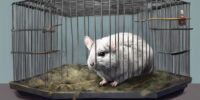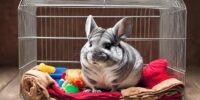What to Do for a Chinchilla With Diarrhea
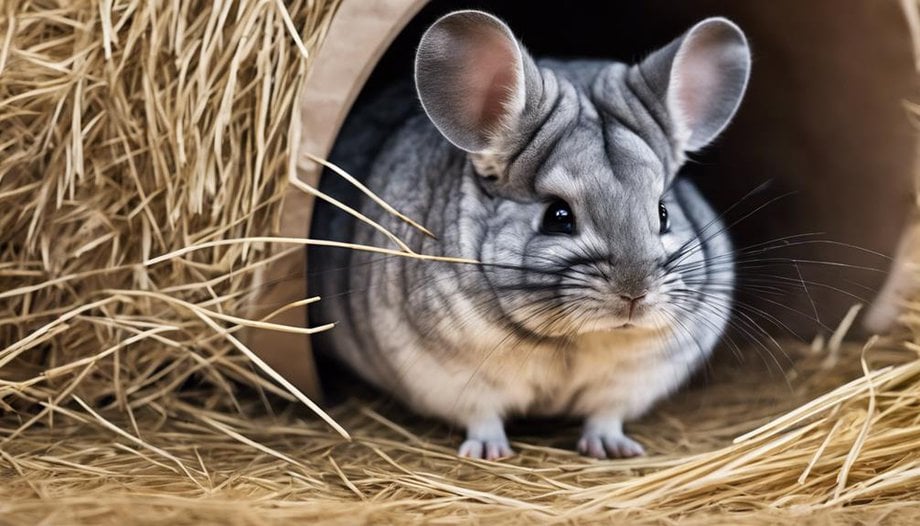
If you notice that your chinchilla has diarrhea, it is important to take action promptly to prevent dehydration and other complications. Here are some tips and considerations to help your chinchilla recover:
- Hydration: Ensure that your chinchilla has access to fresh water at all times. You can also offer oral rehydration solutions specifically designed for small animals to help replace lost fluids and electrolytes.
- Diet: Temporarily switch your chinchilla to a plain diet of hay and pellets. Avoid giving any treats or fresh foods that may worsen the diarrhea. Monitor your chinchilla's appetite and offer small, frequent meals.
- Veterinary Care: If your chinchilla's diarrhea persists for more than a day or is accompanied by other concerning symptoms such as lethargy or bloating, it is crucial to seek veterinary attention. Your vet can determine the underlying cause of the diarrhea and recommend appropriate treatment.
- Clean Environment: Keep your chinchilla's cage clean and dry to prevent further stress and contamination. Remove any wet bedding or soiled areas promptly to maintain a hygienic living space.
Remember, diarrhea in chinchillas can have various causes, including dietary indiscretion, stress, bacterial infections, or underlying health issues. By addressing the problem early and providing proper care, you can help your chinchilla recover and prevent complications.
Understanding Chinchilla Diarrhea
Understanding Chinchilla Diarrhea can be crucial for chinchilla owners in maintaining their pet's health and well-being. Prevention methods play a vital role in keeping chinchillas healthy. Ensuring a clean living environment, providing a balanced diet, and avoiding sudden dietary changes are key in preventing diarrhea. Additionally, chinchillas should have access to fresh water at all times to prevent dehydration, which can exacerbate diarrhea.
Symptom recognition is essential for early intervention. Diarrhea in chinchillas is often characterized by loose, watery stools, a lack of appetite, lethargy, and fur loss around the anus. If a chinchilla displays these symptoms, owners should seek veterinary care promptly.
When it comes to care techniques, providing supportive care such as offering hay, limiting treats, and maintaining a quiet environment can aid in the recovery of a chinchilla with diarrhea. Treatment options may include probiotics, digestive enzymes, or medication prescribed by a veterinarian. Monitoring the chinchilla closely and following the veterinarian's advice are crucial in managing chinchilla diarrhea effectively.
Identifying Potential Causes
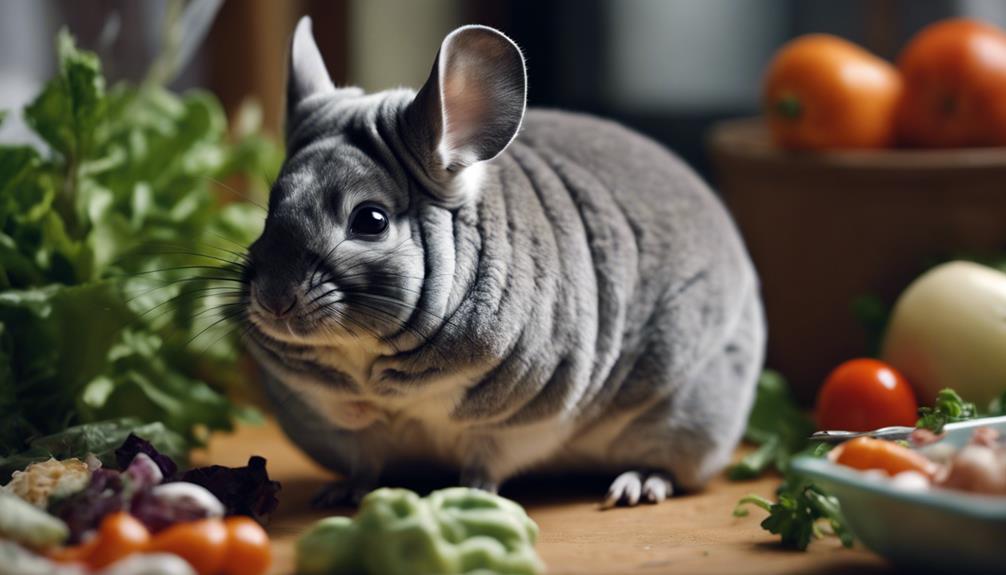
Chinchilla diarrhea can stem from various factors, including dietary triggers, stress-related issues, and underlying health conditions.
Identifying the potential causes of diarrhea is crucial in effectively managing a chinchilla's health. By pinpointing these triggers, owners can take appropriate steps to address the root of the issue and provide necessary care for their pet.
Dietary Triggers for Diarrhea
Identifying potential dietary triggers for diarrhea in chinchillas requires careful observation of their food intake and behavior patterns. Fiber sources play a crucial role in a chinchilla's digestive health. Ensure that your chinchilla's diet includes hay, such as timothy hay, which provides essential fiber for proper digestion.
Additionally, offering a variety of fresh hay and limiting high-sugar treats can help maintain a healthy balance in their gut. Probiotic supplements can also aid in promoting good bacteria in the digestive system, supporting overall gut health.
Keep an eye on any new foods introduced, as sudden changes in diet can upset a chinchilla's stomach. By monitoring their diet closely and providing a balanced, fiber-rich meal plan, you can help prevent diarrhea triggers in your chinchilla.
Stress-Related Diarrhea Factors
To further explore the factors contributing to stress-related diarrhea in chinchillas, it's essential to consider the impact of environmental changes and social interactions on their digestive health. Stress management and herbal remedies can play a crucial role in alleviating stress-induced diarrhea in chinchillas.
Here are four key factors to consider:
- Environmental changes: Sudden alterations in their habitat can lead to stress and digestive disturbances.
- Social interactions: Loneliness or aggression from other chinchillas can cause stress affecting their gastrointestinal system.
- Behavior modification: Implementing calming activities or routines can help reduce stress levels.
- Probiotic supplements: These can aid in restoring healthy gut flora, supporting digestion during stressful periods.
Health Condition Influences
One crucial aspect to consider when examining potential causes of health condition influences in chinchillas is their diet and nutritional intake. Chinchillas require a high-fiber diet consisting mainly of hay to maintain a healthy digestive system. Any sudden changes in their diet or consuming inappropriate foods can lead to digestive issues like diarrhea.
Ensuring that chinchillas have access to clean water and a balanced diet is vital in preventing gastrointestinal disturbances. Additionally, providing occasional treats should be done sparingly to avoid disrupting their digestive health.
If a chinchilla develops diarrhea, treatment options may include adjusting their diet, providing supportive care, and consulting a veterinarian for further guidance on symptom management and developing a recovery plan. Regular monitoring of their diet and health can help prevent future episodes of diarrhea.
Adjusting the Chinchilla's Diet
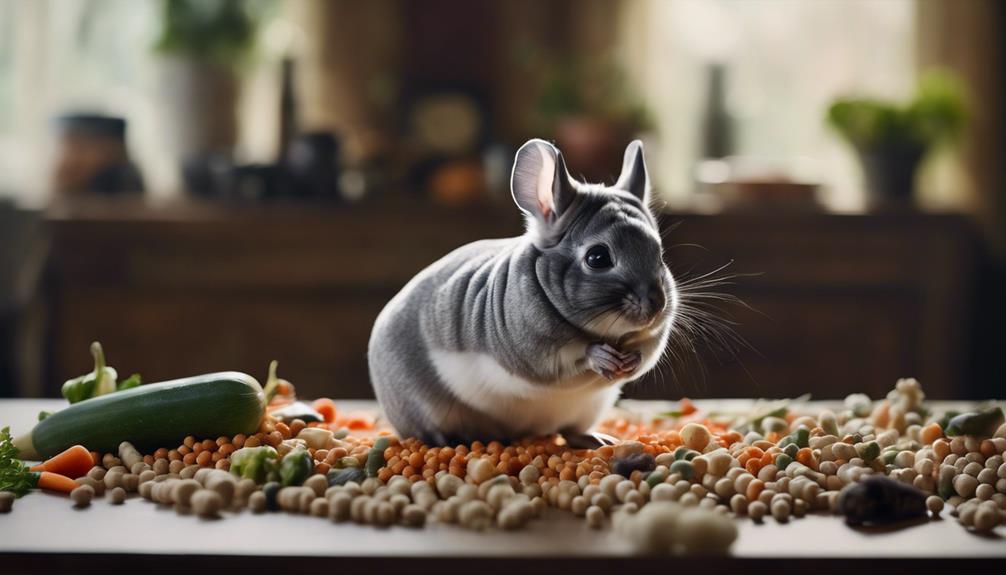
Chinchilla owners should consider adjusting their pets' diet to manage diarrhea effectively. This may involve introducing high-fiber foods and eliminating treats that could be causing digestive issues.
Ensuring proper hydration is also crucial to support the chinchilla's gastrointestinal health.
Dietary Changes
When adjusting a chinchilla's diet to manage diarrhea, it is essential to consider key dietary changes for optimal health maintenance and symptom relief. Here are four essential dietary adjustments to help address your chinchilla's condition:
- Nutritional supplements: Introduce probiotics or digestive enzymes to aid in gut health and digestion.
- Dietary restrictions: Avoid foods high in sugar, fat, or fiber that may exacerbate diarrhea.
- Increase hay consumption: Provide unlimited access to fresh hay to help regulate the digestive system.
- Offer fresh water: Ensure your chinchilla has access to clean water at all times to prevent dehydration and aid in recovery.
Hydration Importance
To ensure optimal health maintenance and aid in symptom relief for a chinchilla experiencing diarrhea, the importance of hydration in adjusting its diet can't be overstated. Hydration maintenance is crucial to prevent dehydration, especially during episodes of diarrhea that can lead to fluid loss.
Providing access to fresh water at all times is essential. Additionally, incorporating watery vegetables like cucumber or offering water-rich fruits can help improve hydration levels.
Alongside dietary adjustments, monitoring progress is vital. Observing the chinchilla's water intake, urine output, and overall well-being is necessary to gauge improvement. If symptoms persist, seeking guidance from a veterinarian is recommended to ensure the chinchilla receives proper care and treatment tailored to its specific needs.
Ensuring Proper Hydration
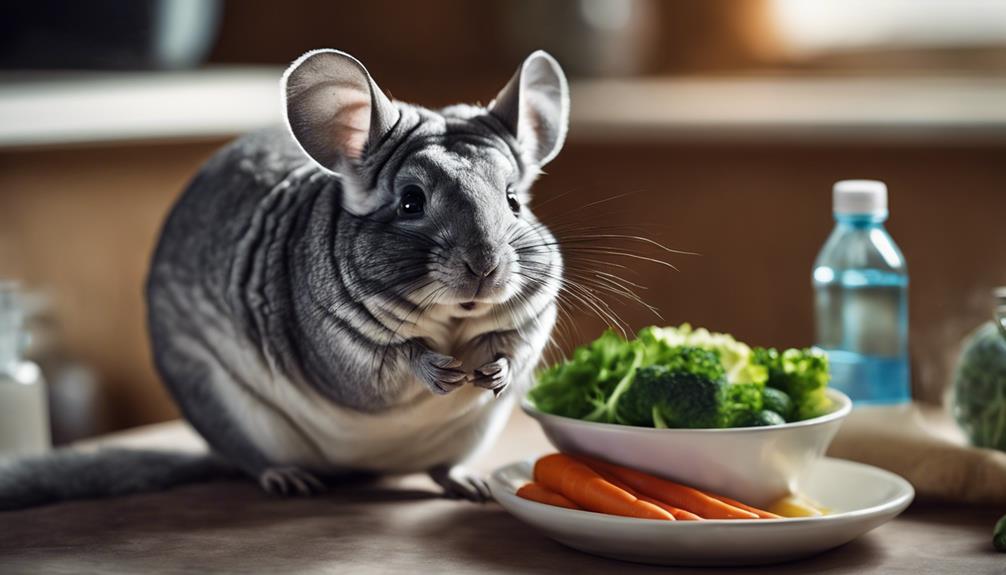
Proper hydration is essential for maintaining a chinchilla's health and well-being. When a chinchilla is experiencing diarrhea, ensuring they have adequate hydration becomes even more critical. Here are some tips to help you ensure your chinchilla remains properly hydrated:
- Monitor Water Consumption: Keep a close eye on how much water your chinchilla is drinking. Diarrhea can lead to dehydration, so it's crucial to make sure they're drinking enough water.
- Provide Fresh Water: Always make sure your chinchilla has access to fresh, clean water. Regularly change their water to ensure it's free from contaminants.
- Offer Electrolytes: In cases of severe diarrhea, consider offering electrolyte solutions specifically designed for small animals to help maintain electrolyte balance.
- Hydration through Fresh Foods: Introduce fresh vegetables and fruits with high water content, like cucumber or lettuce, to help increase their water intake.
Monitoring the Chinchilla's Condition
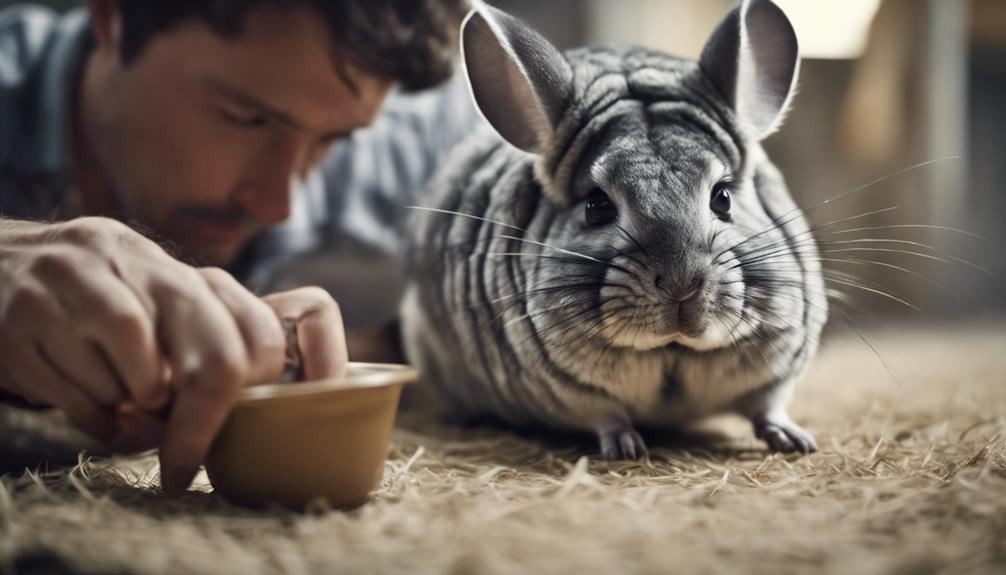
Monitoring the chinchilla's overall health and behavior is crucial in assessing their condition during episodes of diarrhea. Symptoms monitoring plays a key role in understanding the severity of the chinchilla's illness. Keep an eye on their stool consistency, hydration levels, and appetite. If diarrhea persists or worsens despite initial treatment, consulting a veterinarian for further evaluation is essential. Treatment options may vary depending on the underlying cause of diarrhea, so accurate symptom monitoring is vital for effective intervention.
Additionally, tracking the chinchilla's recovery progress is essential. Observing improvements in stool quality, increased activity levels, and a return to normal eating habits signifies positive recovery. However, if the chinchilla shows no signs of improvement or experiences a decline in health, prompt veterinary attention is necessary. Follow-up care post-diarrhea episode is crucial to ensure the chinchilla fully recovers and remains healthy. Providing a balanced diet, maintaining good hygiene, and monitoring for any recurring symptoms are essential steps in preventing future episodes of diarrhea.
Providing a Comfortable Environment
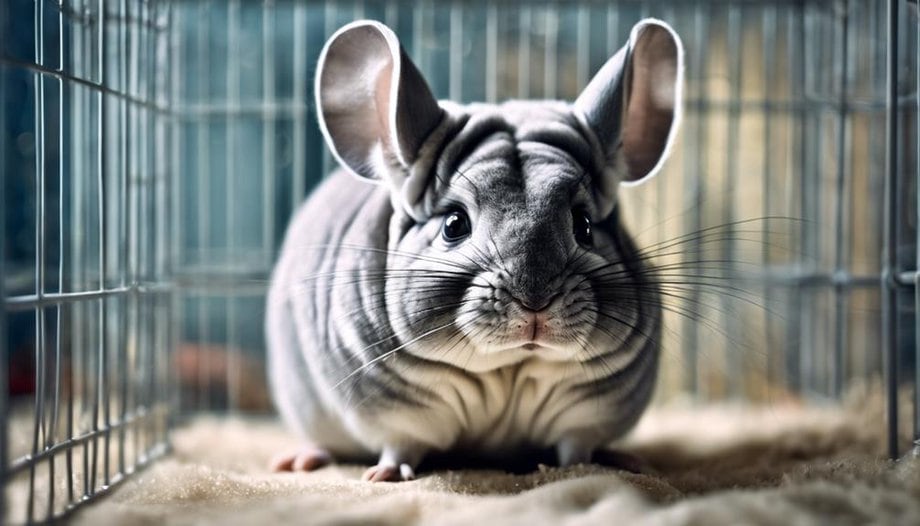
Creating a comfortable environment is essential for promoting the well-being and recovery of a chinchilla experiencing diarrhea. To ensure your chinchilla has the best environment for healing, consider the following:
- Cage setup: Make sure the chinchilla's cage is spacious enough to move around comfortably but cozy enough to feel secure. Provide hiding spots for privacy and safety.
- Bedding options: Opt for soft, dust-free bedding such as aspen shavings or paper-based bedding to prevent irritation. Avoid cedar or pine shavings as they can be harmful to chinchillas.
- Temperature control: Keep the chinchilla's environment between 60-70°F (15-21°C) as they're sensitive to heat. Provide a cool area in the cage where they can retreat if they feel too warm.
- Hygiene maintenance: Regularly clean the cage and change bedding to prevent bacterial growth. Ensure the chinchilla has access to fresh water and a balanced diet to aid in recovery.
Seeking Veterinary Care
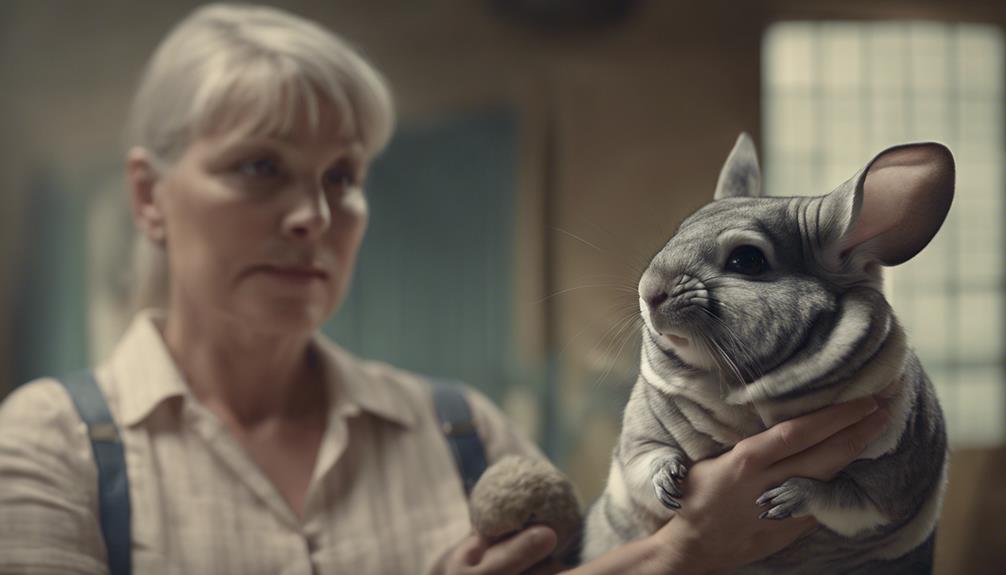
Upon noticing persistent or concerning symptoms, promptly seek veterinary care for your chinchilla experiencing diarrhea. It's crucial to contact an emergency vet specializing in exotic pets, as they possess the expertise needed to diagnose and treat chinchilla-specific conditions effectively.
When you visit the veterinarian, be prepared to provide details about your chinchilla's diet, living conditions, and any recent changes that could be contributing to the diarrhea. The vet will conduct a thorough examination, which may include fecal tests, blood work, and possibly imaging studies to determine the underlying cause of the diarrhea.
Treatment options for chinchillas with diarrhea vary depending on the diagnosis. Your vet may recommend dietary changes, medication, fluid therapy, or other interventions to address the issue. It's essential to follow the vet's recommendations carefully and monitor your chinchilla's progress closely to ensure a swift recovery. Remember, early intervention and proper medical care are key to helping your chinchilla overcome diarrhea and return to good health.
Frequently Asked Questions
Can Chinchilla Diarrhea Be Contagious to Other Pets in the Household?
Chinchilla diarrhea is not contagious to other pets in the household. However, it's crucial to ensure proper hygiene to prevent any potential spread of bacteria or parasites. Regularly clean cages, food/water dishes, and avoid sharing items between pets.
Are There Any Specific Types of Bedding or Cage Materials That Should Be Avoided for a Chinchilla With Diarrhea?
When caring for a chinchilla with diarrhea, it's crucial to avoid certain substrates that may exacerbate the condition. Proper nutrition plays a key role in their recovery. Consult a vet for guidance on safe bedding choices.
How Often Should I Clean My Chinchilla's Cage During a Bout of Diarrhea?
When a chinchilla has diarrhea, it's crucial to maintain a clean cage by cleaning it more frequently than usual. This practice is essential in preventing the spread of bacteria and maintaining good hygiene to aid in treatment.
Can Stress or Anxiety Trigger Diarrhea in Chinchillas?
Stress or anxiety can trigger diarrhea in chinchillas. Dietary adjustments, probiotic supplements, ensuring hydration, and limiting exercise can help. It's important to create a calm environment and monitor the chinchilla closely during stressful times to prevent diarrhea.
Are There Any Natural Remedies or Supplements That Can Help Alleviate Chinchilla Diarrhea Symptoms?
Dietary changes can benefit chinchillas with diarrhea. Adding probiotics may help regulate their digestive system. Ensuring hydration is crucial, and monitoring their condition closely is advised. These natural remedies can aid in alleviating symptoms.

